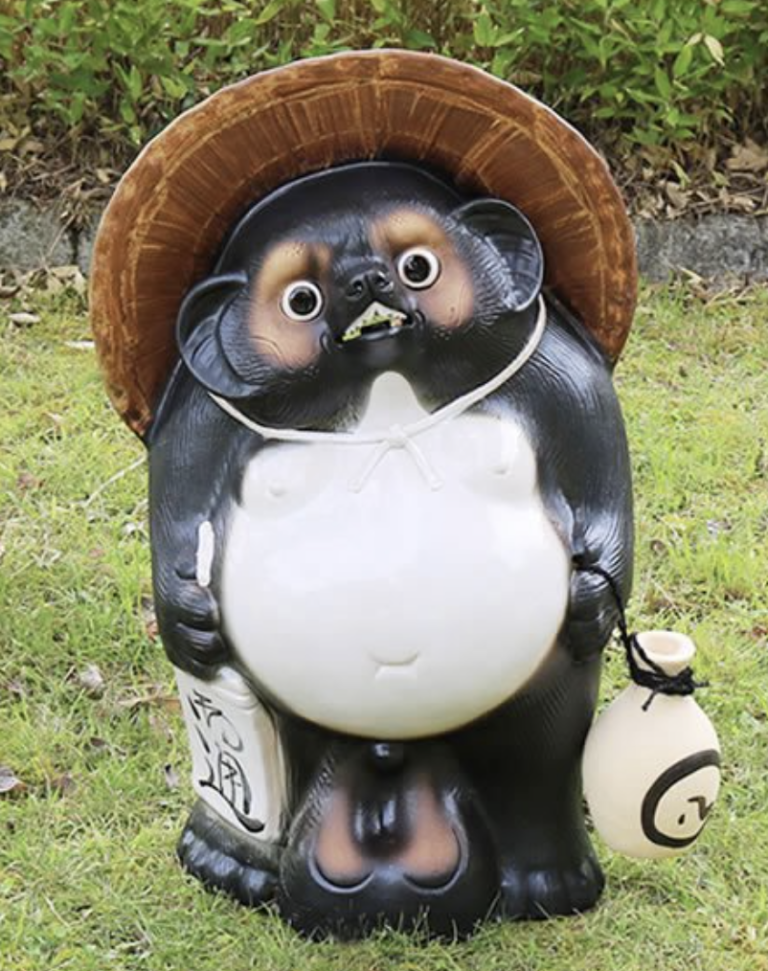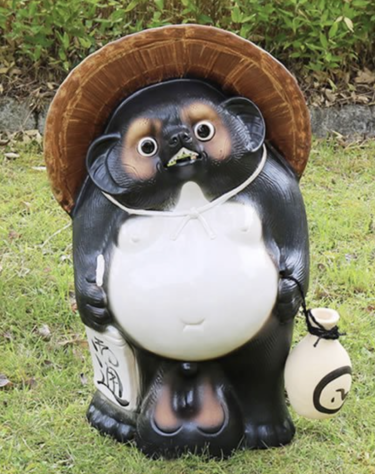はじめに
いつものようにTED-Edの動画を見ていたら日本の神話というタイトルに目についた。しかし、内容は狸の恩返しのような感じだった。舞台は昔の日本なので背景に関する知識はバッチリなので簡単に理解できるような気がした。こんな動画にトライするのも一興かと思った。
(出典:YouTube)
昔話は神話(myth)?
昔話ならOld Storyかと思うのだけど、タイトルはMythになっている。Mythは神話という意味以外に作り話という意味もあった。まあ、確かに狸が何かに化けるとか恩返しするのは、実際にはあり得ないのでmythでもおかしくないのかもしれない。実際は、人の行動をたぬきに擬態化して表現するのはイソップ物語などでもよくみる手法だ。この方が人間、特に子供たちにはわかりやすいのかもしれない。調べるとたぬきに関する昔話はいくつもあった。
狸の恩返し
自分のお腹をぽんぽこぽんのポンポンと叩いてふざけている狸が生捕りにされたのをかわいそうと助けてあげたおばあさんのために、狸が糸を紡いでくれたという話だった。ちょっと違う。前半は似ているけど後半がまったく違っている。
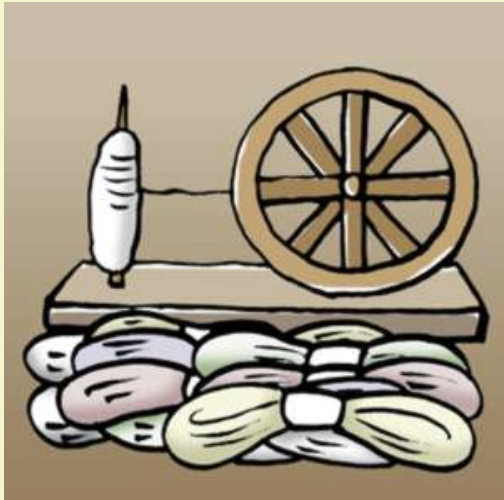
(出典:フジパン)
瑞松寺の吸出し(すいだし)ぐすり
畑を荒らすたぬきに困っていた村人に追いかけられた悪さをしていない狸を寺の住職が助けてあげた。そのお礼に住職が困っていたお尻のできものを治す薬の作り方を書いた葉っぱを贈った。住職は、それをおできに困っている多くの人のために薬を作って、「特効薬 狸吸出薬」として多くの人に分け与えて大評判になったという話。これも情けは人のため非ずをテーマにしているところは共通だった。
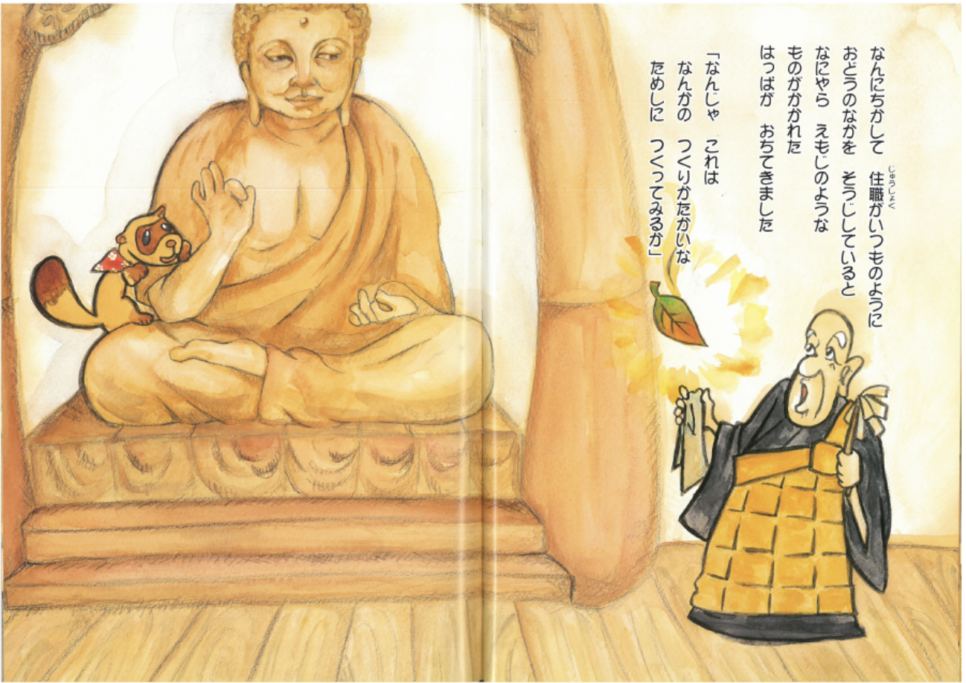
(出典:東淀川区)
分福茶釜
助けてもらった狸が茶釜に化ける昔話はいくつかあるが、関敬吾の著書「日本昔話大成」では、ある男が狸と助けた代償として茶釜になりすまさせ、これを売って儲ける。英文版では和尚に売り、磨かれると茶釜は痛いといい、火にかけられると熱いといって踊りだすとあり、まさにこの動画だ。小波文庫では芸で金儲けをさせるモチーフも見られ、分福茶釜として語り継がれている。やはりこれも困った人には親切にしなさいという教えを面白おかしく語り継いだもののようだ。
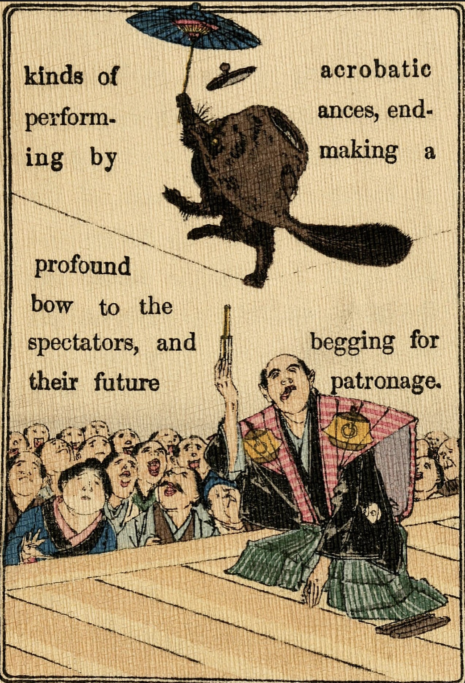
(出典:分福茶釜)
8つの質問
Q1) On his travels, a kindly traveling salesman discovered:
「旅をしていた親切な行商人に助けてもらってのは?」という設問で、これは罠にかかった狸「A tanuki in a trap」だろう。
Q2) After discovering a rusty tea kettle, the salesman sold it to:
「錆びた茶釜を発見した行商人が持ち込んだ先はどこか?」という設問でこれはお寺「A monastery」となる。
Q3) According to myth, tanukis were magic shape-shifters who changed their form by:
たぬきは変身が得意とされるが、どのような方法で変身したかという設問だけど、これは良く分からなかった。何度か聞き直すと「He had heard tales of shape-shifting tanuki who transformed by pulling on their testicles.」と言っていた。このtesticleが睾丸という意味だった。
Q4) The tanuki transformed into a kettle to:
たぬきがやかんに変身したのは目的を聞いている。これは行商人に恩返しをするためなので、英語では次のような感じか。
Q5) After his discovery, the tanuki:
発見された後にたぬきは何をしたかという設問なので、僧侶や訪問者を楽しませただ。英語だと次のような感じか。
Q6) What sort of personalities are mythical tanukis thought to have?
昔話などに登場するたぬきはどのような性格をしていると考えられるかという設問だ。狸は悪戯好きで、人が困らせるようなことをする反面、正直者でお調子者と考えられているようだ。英語だと次のような感じか。
Q7) Why would you place a Tanuki outside a home or a business?
なぜ、たぬきを家庭や会社の外に置くのかという設問だ。たぬきは素直で可愛い生き物だからかと思ったけど、動画を聞き直すと悪戯をする狸を騙すためのようだ。しかし、アイキャッチ画像の信楽焼たぬきは、福を呼ぶ縁起物される。タヌキのキンタマが大きいためか、金運、開運、勝負運、魔除け、商売繁盛などのご利益があるとされている。見ているだけど人の心を和ませるほっこりしたイメージだ。
I thought tanuki is an honest and lovely creature. But it seems to trick Tanuki into taking their antics elsewhere based on this content.
Q8) Why did the monks choose to keep the tanuki?
寺の住職はなぜたぬきを飼うことにしたのかという設問だ。住職はたぬきは性格の悪い生き物ではなく、可愛くて正直な生き物だと思われたためと思う。英語だと次のような感じか。
「情けは人のためならず」
情けは人のためならずをDeepLで英訳してみたら、「the good you do for others is good you do yourself.」と正しく翻訳された。しかし、平成22年度に行われた世論調査では、正しく理解している人と、間違って理解している人の比率が約46%と同じだった。間違っているのは、「人に情けを掛けて助けてやることは,結局はその人のためにならない」という解釈であり、50歳以下ではほぼどの年代もこちらが多数派だ。日本社会の良いところは助け合いなのだけど、社会の倫理観が変わってきたのだろうか。

(出典:文化庁)
まとめ
日本の昔話を聞いて学ぶべきは海外の子供達ではなく、日本の子供達なのかもしれない。人には親切にしようねという教えより、見て見ぬふりをしなさいという教えが現実には多いのかもしれない。どうすれば良いのだろう。ちょっと悲しい。
以上
最後まで読んでいただきありがとうございます。
拝
参考:英文スクリプト
On the dusty roads of a small village, a traveling salesman was having difficulty selling his wares. He had recently traversed the region just a few weeks ago, and most of the villagers had already seen his supply. So he wandered the outskirts of the town in the hopes of finding some new customers. Unfortunately, the road was largely deserted, and the salesman was about to turn back when he heard a high-pitched help coming from the edge of the forest.
Following the screams to their source, he discovered a trapped tanuki. While these raccoon-like creatures were known for their wily ways, this one appeared terrified and powerless. The salesman freed the struggling creature, but before he could tend to its wounds, it bolted into the undergrowth. The next day, he set off on his usual route. As he trudged(トボトボ歩く) along, he spotted a discarded tea kettle. It was rusty and old – but perhaps he could sell it to the local monks. The salesman polished it until it sparkled and shone. He carried the kettle to Morin-ji Temple and presented it to the solemn monks. His timing was perfect – they were in need of a large kettle for an important service and purchased his pot for a handsome price.
To open the ceremony, they began to pour cups of tea for each monk – but the kettle cooled too quickly. It had to be reheated often throughout the long service, and when it was hot, it seemed to squirm(もがく) in the pourer’s hand. By the end of the ceremony, the monks felt cheated by their purchase and called for the salesman to return and explain himself. The following morning, the salesman examined the pot, but he couldn’t find anything unusual about it. Hoping a cup of tea would help them think, they set the kettle on the fire. Within moments, the metal began to sweat. Suddenly, it sprouted a scrubby tail(尻尾), furry paws, and pointed nose. With a yelp, the salesman recognized the tanuki he had freed. The salesman was shocked. He had heard tales of shape-shifting tanuki who transformed by pulling on their testicles. But they were usually troublesome tricksters, who played embarrassing pranks(悪戯) on travelers or made it rain money that later dissolved into leaves.
Some people even placed tanuki statues outside their homes and businesses to trick potential pranksters into taking their antics(悪ふざけ) elsewhere. However, this tanuki only smiled sweetly. Why had he chosen this unsuspecting form? The tanuki explained that he wanted to repay the salesman’s kindness. However he’d grown too hot as a tea kettle, and did not like being burned, scrubbed, or polished. The monk and salesman laughed, both impressed by this honorable trickster. From that day on, the tanuki became an esteemed guest of the temple. He could frequently be found telling tales and performing tricks that amused even the most serious monks. Villagers came from far away to see the temple tanuki, and the salesman visited often to share tea made from an entirely normal kettle.

